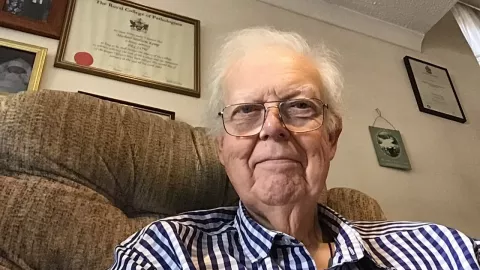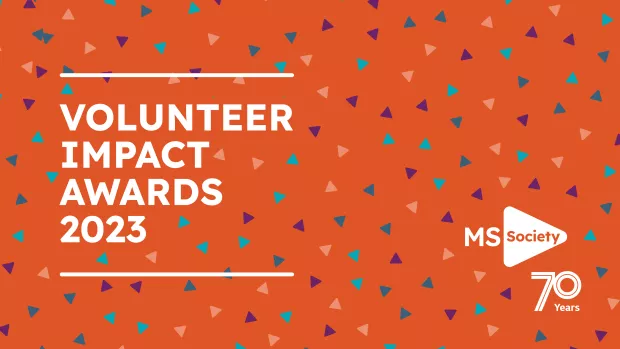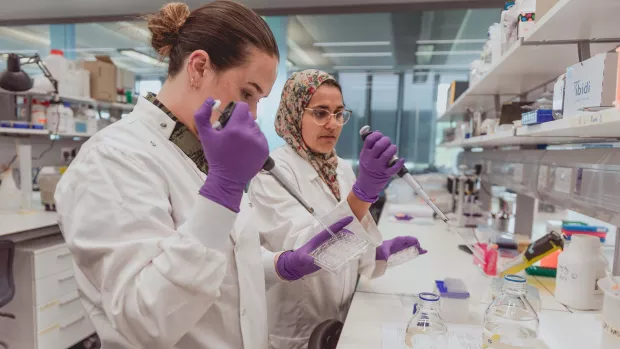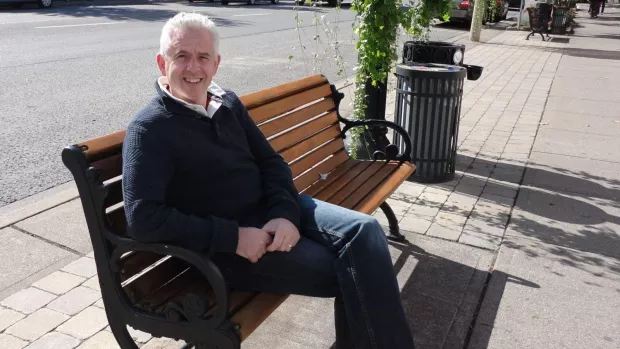
Involving myself in science in a new way
Mike Kemp is a retired biochemist with primary progressive MS. He tells us about using his lived experience to review research grant applications, as a member of our Expert Research Network.
I was first diagnosed with primary progressive MS in 2007. Before that I’d been diagnosed with kidney cancer and had my left kidney removed in 2002.
A few years later, I started getting odd neurological symptoms and my oncologist referred me to a neurologist. When an MRI suggested I had MS, my wife and I were really pleased, because we thought I had brain secondaries from my kidney cancer! My neurologist was surprised that we both seemed relieved. If only I knew then what I know now.
Filling a gap in my life
I was a consultant clinical biochemist in the NHS, but retired from work in 2008 when commuting into London became just too difficult.
When I was working, I was phoned a lot, even in the evenings, to advise medics on test results. Now, the phone never rang. I eventually thought it was about time I got off my bottom and found something to get involved in.
So, I started volunteering with the National Cancer Research Institute in a clinical studies group, as a lay member affected by cancer. Then, in 2010, I took up my first role as a lay member and reviewer with the MS Society. Back then, lay reviewers were members of the MS Society Research Network who reviewed health and social care research grant applications from a patient’s perspective.
A few years later, the MS Society started involving people with MS in biomedical grant applications as well. Because of my background as a scientist, this really interested me. So I had an interview and was accepted as a member of the panel. The panel was made up of three lay members with MS, and a number of scientists and clinicians specialising in MS research.
Joining The Expert Review Network
In late 2019 early 2020, the MS Society changed how it handles grant applications. Forming The Expert Review Network (TERN) we have today. TERN deals with all research funding applications, whether they’re health and social care or biomedical. At the last count, there are 30 MS researchers and 10 lay members.
The lay reviewers don’t need to have a scientific background like me. Our job is to comment on research applications from the point of view of someone with MS, not on the science. We look at whether a proposed research project will really benefit the MS community. And we consider practical things such as whether someone with MS would be able to attend the number of MRI scans a research project might need.
How it all works
Researchers can apply for grant funding at different times throughout the year. Each application is initially reviewed by members of the Research Network (lay review) and by researchers with the relevant expertise (peer review). The reviewers at this point may or may not be TERN members. MS Society staff select appropriate reviewers for each application.
At the end of each funding round, when all the applications have been reviewed, members of TERN are invited to join a funding review panel. At the last one I attended there were 11 researchers, three lay members, and five MS Society staff.
Panel meetings
Each funding panel has its own chairperson, who’s an eminent scientist in the MS field. Two researchers and one lay member present each application to the remainder of the panel. The panel then scores the applications and recommends which should be funded, depending on the budget available. Sometimes, the panel suggests that a researcher should revise their application and resubmit it in the next round.
When I’m on a panel, I feel privileged to contribute to a process that can have such important outcomes. But I’m always aware of the fact that we’re making decisions about spending publicly-raised money. It’s a responsibility that I take very seriously — as I think all TERN members do.
There are no guarantees that all the applications the panel recommends will ultimately be funded. When the MS Society has made the final decisions, panel members find out which have been successful.
Achieving successful co-production
Involving people like me in research funding decisions makes TERN a good example of co-production. And what makes this work is mutual respect. The researchers are all experts in the science involved in studying MS, and we lay reviewers are experts in daily living with MS. So, the researchers treat us as equals, which is something I’ve really appreciated.
It’s also very important that all the members of the group get on, which we do — although this was much easier when meetings were face to face and we could chat in the breaks. But Zoom meetings (which have remained after the pandemic) mean that less time is wasted with members travelling long distances for meetings. And, as my mobility worsens, I now don’t have to worry about getting to London.
Contribute by doing something you’ll enjoy
Being involved in TERN has made me realise that there are many facets to MS. Everybody’s MS is different — there’s always someone worse (or better) off than me. I don’t feel sorry for myself at all. It’s also showed me that I can make a contribution, however small, in the campaign to Stop MS.
The MS Society needs many different volunteers, with different talents. I’m interested in the biology of MS, and I’m lucky that I can use my knowledge of science in this way. I enjoy what I do!
If you’re thinking about volunteering, then go for it! If you think you’ve got something to offer then you certainly should. But, above all, make sure it’s something you’ll enjoy doing.




